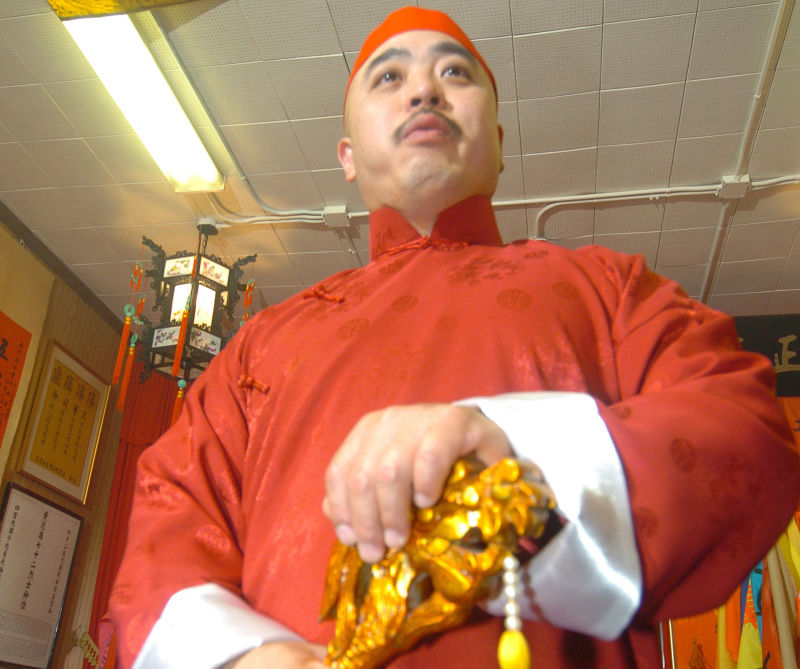He then started driving by 603 Jackson St. in San Francisco's Chinatown -- where Leung would eventually be shot to death on Feb. 27, 2006. But when he got the call from "Kevin" to do the shooting, Chanthavong said he got cold feet.
"I didn’t want to be a part of it," he said. "I’m not a killer. I’m a drug dealer."
He said a few weeks after he walked away from the job, he read Allen Leung's name in the newspaper.
"I had no reaction," he said. "I knew it was going to happen, so it wasn’t a surprise."
Federal prosecutor Waqar Hasib asked him if he ever asked Raymond Chow about the killing after it happened.
"No," he answered. "It's something you don’t talk about. I mean, the guy was murdered. I didn’t ask. That’s the thing -- you don’t ask questions. Once it’s done, it’s done."
Chanthavong is one of Chow's nearly two dozen co-defendants. He said he pleaded guilty to racketeering, marijuana and cocaine distribution, narcotics manufacturing, being a felon in possession of a firearm and selling firearms without a license -- at least three he sold to an undercover FBI agent.
Hasib asked him what he hoped to get in exchange for his testimony.
"I get a break out of it," Chanthavong answered, "a lesser sentence."
According to FBI Special Agent William Wu, who was cross-examined Tuesday, Chow began plans to take out Allen Leung in late 2003.
Chow’s attorney, Curtis Briggs, peppered Wu with questions about why the bureau in 2004 withdrew support for Chow's release from immigration custody. Chow was awaiting a visa in exchange for testifying against another member of “Jackson Street Boys,” a Chinatown gang, according to Wu.
The agent repeatedly described a “series of events,” which individually were uncorroborated, but taken together, the FBI could “no longer feel comfortable that we can monitor Mr. Chow.”
Leung got in touch with the FBI through the SFPD's Gang Task Force in late 2003.
"Allen Leung told me that Raymond Chow came to remove him and somebody else," he said, later clarifying Leung meant the head of another tong, "so he could take over and clean up Chinatown."
Wu met with Leung three times in quick succession that November, the agent testified, and each time he said he was scared of Raymond Chow. Wu, Chow's handling agent, asked Leung to wear a wire.
"Mr. Leung refused to wear the body wire because he was afraid if Mr. Chow found the wire, he would kill him," Wu said, adding that Leung told him, as a gang member, he could not use law enforcement to set up another gang member.
"But he's talking to you," Briggs said. "He’s doing exactly what he said he swore not to do?"
Wu said that was true, and after Leung refused to wear the wire, there wasn't much else the FBI could do.
Leung later told Wu, the agent testified, that an associate of Chow's showed up with 40 gang members to intimidate the former dragon head. Then in February of 2005, Wu said, someone splattered red paint on every one of Chinatown's tongs except for Hop Sing. Leung, the head of Hop Sing Tong, again contacted Wu and was frightened.
"Red paint signifies blood," Wu said. "It’s the start of a gang war."
Leung told Wu, according to the agent, that Hop Sing Tong was being set up.
Then a month later, two gunshots were fired at the front of Hop Sing Tong's headquarters.
"That’s violence we do not and cannot tolerate," Wu said.
Chow was never directly linked to any of the incidents and denied any involvement.
"You took every gang member’s word over his," Briggs said.
Nevertheless, the FBI's support for Chow's monitored release from immigration custody was revoked, and Chow went back into custody for about a year, although the U.S. Attorney's Office continued to advocate for his release.
"After Mr. Chow was turned back into custody, Chinatown was quiet for that entire year, until he was released again," Wu said.

